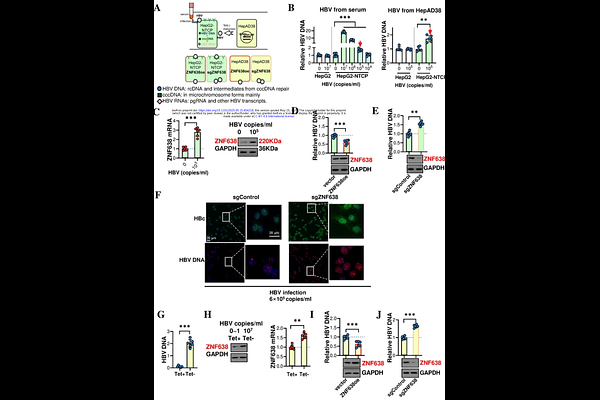ZNF638 represses the transcription of HBV closed circular DNA involving HUSH complex-mediated histone modifications of epigenetic silencing

ZNF638 represses the transcription of HBV closed circular DNA involving HUSH complex-mediated histone modifications of epigenetic silencing
Meng, S.; Sha, X.; Zhang, G.; Duan, B.; Wang, J.; Si, Y.; Li, F.; Wu, Q.; Cheng, S.; Ding, W.
AbstractHepatitis B virus (HBV) infection poses a critical threat to public health burden worldwide. As the major template of viral transcription, the covalently closed circular DNAs (cccDNAs) of HBV was known to form microchromosomes and interact with various host proteins. In the present study, ZNF638 was found to significantly reduce the transcription of HBV into pgRNAs, and subsequently reduce cccDNA formation and viral propagation. We discovered that ZNF638 was able to bind the preS and S gene regions of HBV, repressing the transcription of cccDNA upon increased modification of H3K9me3 mediated by SETDB1. This epigenetic silencing of cccDNA transcription was further demonstrated to involve the activity of HUSH, a multi-protein complex to mediate epigenetic modifications of histone into suppressed nucleosomes. In in vivo models, we evaluated the effects of ZNF638 deficiency on HBV-targeting siRNA therapy. A significant reduction of the efficacy was observed in animals with reduced ZNF638 expression. In summary, we report that ZNF638 is a potent host factor to repress the transcription of HBV DNAs and to attenuate HBV infection. The role of ZNF638 on HBV repression involves its binding to cccDNA at specific regions for recruiting HUSH complex to write H3K9me3 histone marks for epigenetic silencing. ZNF638 serves as a critical host factor to associate HBV infection and disease progression. Additionally, ZNF638 serves as a potential indicator to predict the outcome of HBV-targeting siRNA therapy.